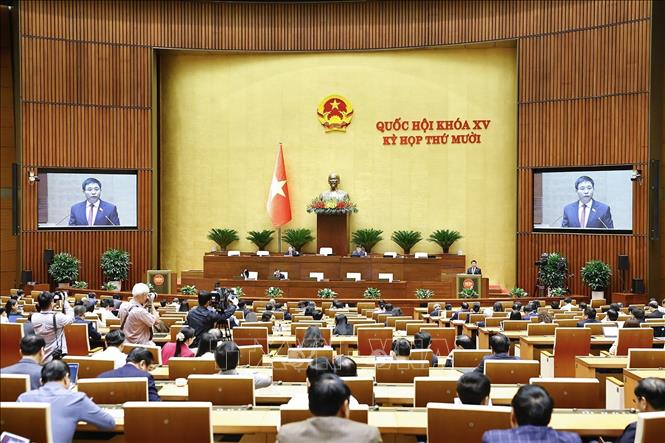
Effective tool in planning, developing and creating development space
According to the Government's submission on adjusting the National Master Plan for the 2021-2030 period, with a vision to 2050, the planning contents are supplemented and adjusted to suit the arrangement of administrative units at all levels, implementing the 2-level local government model; striving to achieve double-digit growth targets in the 2026-2030 period and the following years; making breakthroughs in science and technology development, innovation and digital transformation, education and training; protecting, caring for and improving people's health; and energy security.
According to the Proposal, some contents in the general objectives of the adjustment of the National Master Plan are adjusted and supplemented as follows: "By 2030, strive to be a developing country with modern industry and high average income; establish a new growth model, taking science and technology, innovation and digital transformation as the main driving force; an effective, unified and sustainable national development space organization model, dynamic regions, economic corridors and growth poles promoting the leading role in socio-economic development and enhancing national competitiveness; have a synchronous and modern basic infrastructure network; ensure major balances, enhance the resilience of the economy...".
Adjusting some key targets: Strive for an average GDP growth rate of more than 8%/year in the 2021-2030 period; of which the 2026-2030 period will reach 10%/year or more. By 2030, GDP per capita at current prices will reach about 8,500 USD. The average social labor productivity growth rate will reach over 8.5%/year in the 2026-2030 period. In the 2031-2050 period, strive for a GDP growth rate of about 7-7.5%/year; GDP per capita at current prices by 2050 will reach about 38,000 USD.
Based on the assessment of the current state of the national territory, zoning plans for each period and development requirements in the new context, the whole country is divided into 6 socio-economic regions including: Northern Midlands and Mountains; Red River Delta; North Central Region; South Central Coast and Central Highlands; Southeast Region; Mekong River Delta...
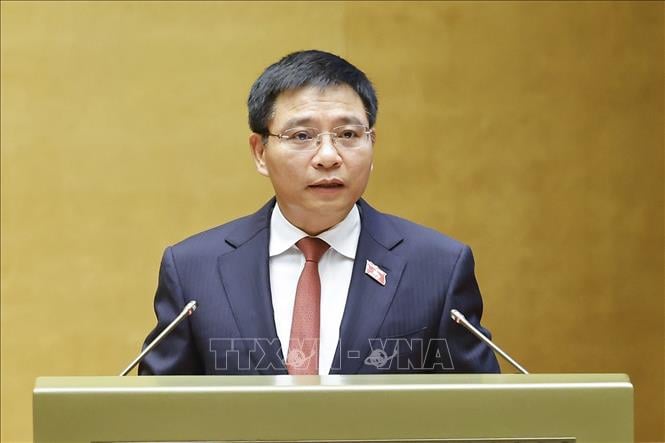
Presenting the Government's Report on the draft Law on Planning (amended), Minister of Finance Nguyen Van Thang emphasized the goal of making planning truly "an effective tool of the State in planning, developing and creating development space". The draft Law has completed the regulations on the planning system, including: National-level planning: National master plan, National marine spatial planning, National land use planning, Sectoral planning; Regional planning, Provincial planning, Sectoral detailed planning, Urban and rural planning; Planning of special economic administrative units decided by the National Assembly.
In particular, the draft Law focuses on amending and supplementing regulations on the relationship between types of planning to ensure continuity, inheritance, stability, hierarchy, and serve as a basis for handling conflicts between plans.
Regarding decentralization of authority, the draft Law proposes decentralizing the approval of the National Marine Spatial Planning and the National Land Use Planning to the Prime Minister; decentralizing the approval of sectoral planning to the Government to ensure flexibility in direction and administration; decentralizing the approval of detailed sectoral planning to the Minister; and decentralizing the approval of provincial planning to the Chairman of the Provincial People's Committee to ensure post-inspection work.
The draft Law supplements regulations on monitoring, inspection and review of planning. At the same time, the draft has reviewed and reduced the number of sectoral plans and detailed sectoral plans, reducing them from 78 to 49, equivalent to a reduction of 37%.
Regarding the draft Law amending and supplementing a number of articles of the Law on Urban and Rural Planning, Minister of Construction Tran Hong Minh said that the draft Law was developed with the goal of ensuring the consistency and synchronization of the legal system, including amending and supplementing 16 articles to comply with the laws on planning, land, construction, decentralization of authority, decentralization, and simplification of administrative procedures; technically adjusting 21 articles, abolishing 2 articles to comply with the organization of 2-level local governments and keeping 20 articles unchanged.
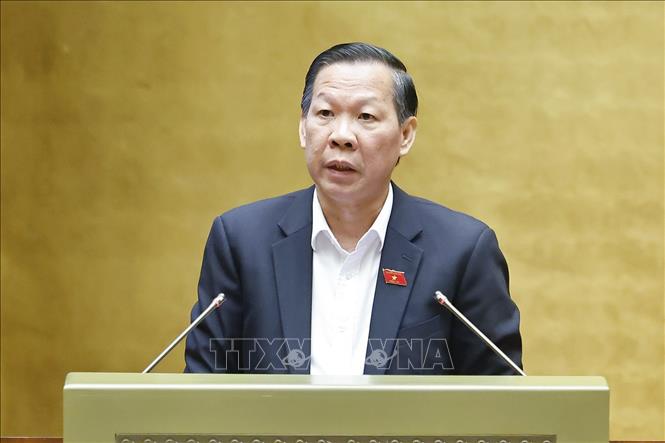
Presenting the review reports, Chairman of the National Assembly's Economic and Financial Committee Phan Van Mai said that the Economic and Financial Committee agreed on the necessity of amending both Laws and adjusting the National Master Plan to remove institutional bottlenecks and promote rapid and sustainable economic development; and proposed to consider approving them under a shortened process at one session.
The Economic and Financial Committee recommends continuing to review and clarify the roles, classifications and relationships between planning types, ensuring that each type has its own scope, objectives and content, avoiding duplication.
Ensuring quality and stability of planning
During the discussion session in groups, National Assembly delegates focused on analyzing practical problems in planning work, especially related to quality, stability and decentralization.
Minister of Finance Nguyen Van Thang, National Assembly delegate (Dien Bien) expressed his support for promoting decentralization and delegation of power to localities in the spirit of "locality decides, locality does and locality is responsible". The Minister proposed decentralizing the authority to approve the General Planning of centrally-run cities to the Chairman of the Provincial People's Committee, instead of the Prime Minister, to ensure synchronization with the Provincial Planning and avoid delays in implementing investment projects in dynamic centers.
The Minister also proposed to eliminate the intermediate planning level of the Zoning Plan, and only retain the general planning and detailed planning to save time and avoid additional procedures for assessing the suitability of the project. The Minister also proposed to supplement regulations on the type and level of planning for commune-level administrative units.
However, in the review report, the Economic and Financial Committee stated that if the content of the Zoning Plan is "integrated" into the General Plan, it will make the content of the General Plan more complicated, take more time to prepare the General Plan, and potentially create new problems.
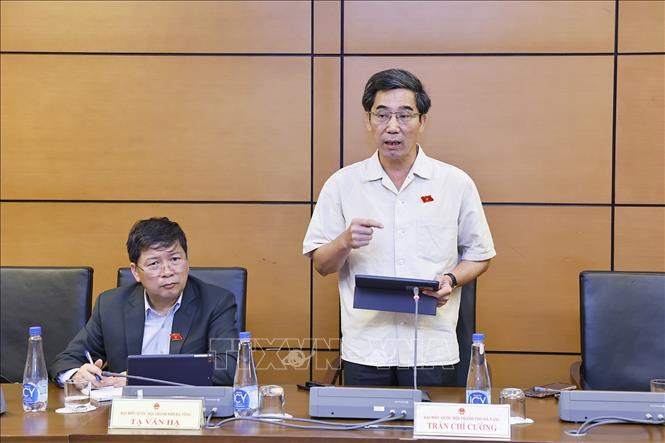
Delegate Tran Chi Cuong (Da Nang) expressed concern about the excessive decentralization to the grassroots level, especially assigning the commune level to approve detailed planning according to Decree 151/2025/ND-CP, because there are not enough specialized staff to read drawings and understand the planning for approval.
Discussing the stability and quality of the Planning, delegate Ta Van Ha (Da Nang) expressed his concerns about the quality and lack of consistency of the planning. According to the delegate, currently, many localities have a situation of arbitrary "flexible" adjustments leading to "shredding" of the planning. Delegate Ta Van Ha emphasized that planning needs to have a long-term vision, lasting 50 years, 100 years and cannot be arbitrarily adjusted. The delegate also raised the issue of the capacity of the design consulting team, stating that the quality of the planning is "too weak" and the situation of "copying" in planning between provinces.
Agreeing with the above opinion, delegate Tran Chi Cuong said that the repeated adjustment of planning was due to external factors and "term thinking", stemming from the "chase after achievements" of development, growth and budget collection, leading to having to accept adjustments according to investors' requests, even in some places adjusting detailed planning up to 10 times.
Faced with increasingly complex natural disasters and climate change, especially recently, many urban areas have been severely flooded. Many National Assembly delegates expressed concern that the planning of flood and drainage corridors for urban areas has not been given due importance.
Delegate Nguyen Duy Minh (Da Nang) pointed out that the problem of urban flooding in cities such as Da Nang, Hue, Hanoi, and Ho Chi Minh City is increasingly serious. The main cause is that flood drainage corridors are narrowed, filled or invested in urban areas. The delegate cited statistics from the Ministry of Agriculture and Environment in 2024, showing that about 20,000 hectares of riverside land have been converted, causing flood drainage capacity to decrease by 15 to 30% compared to the 2010 period.
The delegate pointed out the legal gap when the Law on Dikes only applies to diked rivers, and the Law on Natural Disaster Prevention and Control and the Law on Water Resources only stipulate the determination of flood escape corridors when making irrigation plans but "does not require integration into urban planning". Therefore, the delegate suggested that in this law amendment, it is necessary to clarify the determination and protection of flood escape corridors in rural urban planning projects, considering it a mandatory content and not just a recommendation of the drafting agency. The delegate emphasized: "If the planning, as experts say, cannot read the path of floods, then the urban area will also be unsafe".
Discussing the adjustment of the National Master Plan and regional linkage, delegate Dao Chi Nghia (Can Tho) expressed his agreement with the timely adjustment of the National Master Plan this time, affirming that the draft Resolution of the National Assembly on adjusting the National Master Plan for the 2021-2030 period, with a vision to 2050, has clarified the role of the national master plan as the backbone in leading regional and provincial planning.
Delegates recommended that the Government should soon issue an implementation plan when the resolution takes effect, so that the spirit of the resolution can be implemented immediately.
Regarding the list of important national projects, the delegate proposed upgrading the Ho Chi Minh City - Can Tho railway line from "investment preparation research" to "priority group for investment preparation". According to the delegate, this is a great wish of the voters of the Mekong Delta, and at the same time suggested adding Tran De port and expanding Can Tho international airport to the list of priority investment projects.
Delegate Dao Chi Nghia also commented that the revised content on regional linkages is still general and does not meet the specific characteristics of the Mekong Delta. The delegate suggested that there should be a separate financial mechanism for regional linkage activities, and that the Regional Coordination Council should be authorized to establish the Mekong Delta Regional Linkage Fund.
In addition, delegates proposed extending the planning period for sectors such as transportation, irrigation, and energy to 20 years, instead of applying a general 10 years as in the draft, to ensure economic stability and efficiency.
Source: https://baotintuc.vn/thoi-su/nang-cao-tinh-on-dinh-va-phan-cap-phan-quyen-trong-cong-tac-quy-hoach-20251107121645719.htm








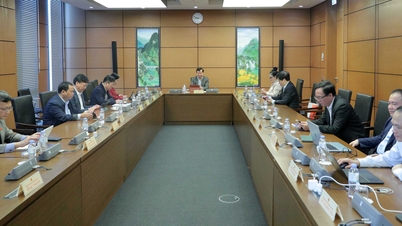

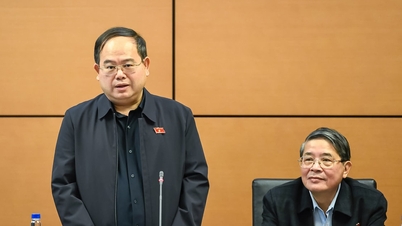


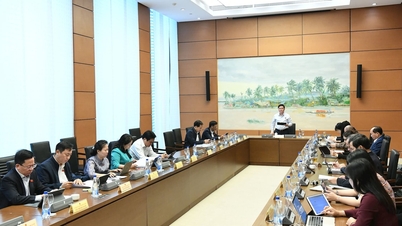
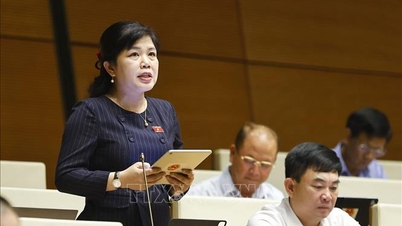
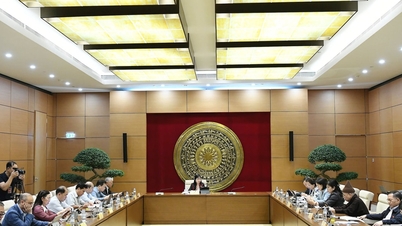
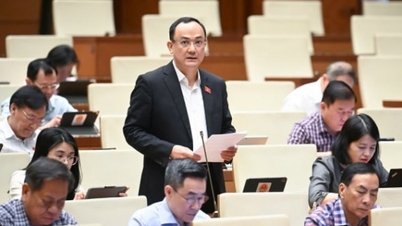






![[Infographic] Vietnam's stock market exceeds 11 million trading accounts](https://vphoto.vietnam.vn/thumb/402x226/vietnam/resource/IMAGE/2025/11/09/1762677474332_chungkhoanhomnay0-17599399693831269195438.jpeg)









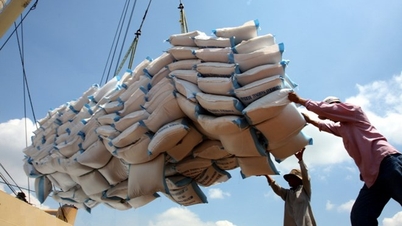
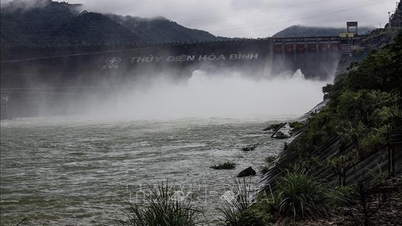









































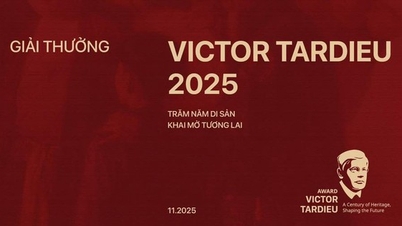


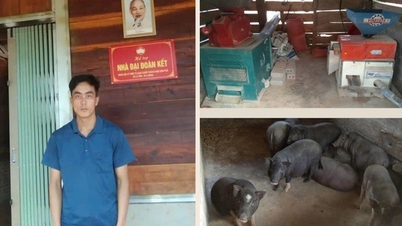







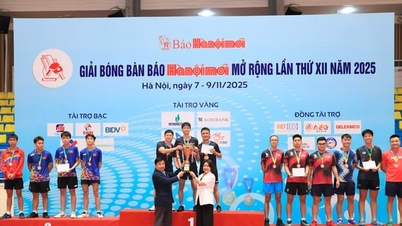




![Dong Nai OCOP transition: [Part 2] Opening new distribution channel](https://vphoto.vietnam.vn/thumb/402x226/vietnam/resource/IMAGE/2025/11/09/1762655780766_4613-anh-1_20240803100041-nongnghiep-154608.jpeg)













Comment (0)